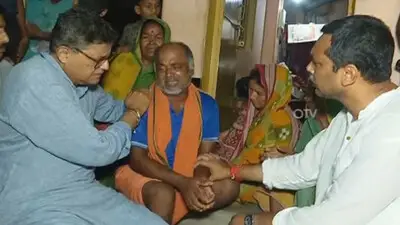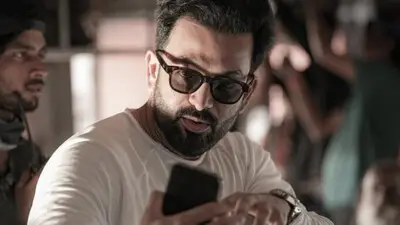Recommended Stories
Pointing out that India attaches the highest importance to its relations with Myanmar, a "close friend and neighbour", Singh said in a statement shortly before his departure for Nay Pyi Taw, Myanmar`s new capital, that "recent years have witnessed significant strengthening and expansion of our bilateral relations" and his coming visit "will provide an opportunity to review the progress in implementation of decisions" taken during the "highly successful visit" of Myanmar President Thein Sein to India in October last year.
"We will also consider new initiatives and define a roadmap for the further development of our cooperation in the years ahead," said Singh who will be the first Indian Prime Minister to visit Myanmar in quarter of a century since Rajiv Gandhi`s trip to that country in December, 1987.
The Prime Minister, who will hold talks with Sein tomorrow at Nay Pyi Taw, said that during his visit to Myanmar he hopes to focus on "stronger trade and investment links, development of border areas, improving connectivity between our two countries and building capacity and human resources".
"We also hope to sign a number of agreements and MoUs to further strengthen our bilateral cooperation in these areas, besides promoting people-to-people contacts," Singh said.
Singh, who will also meet leader of the opposition and Nobel Laureate Aung San Suu Kyi in Yangon on Tuesday, said India welcomes Myanmar`s "transition to democratic governance and the steps taken by the government of Myanmar towards a more broad-based and inclusive reconciliation process and offered to share "democratic experiences" with that country.
Since taking office more than a year ago, President Thein Sein has surprised many critics by releasing Suu Kyi from 15 years of house arrest and allowing her National League for Democracy (NLD) to contest and win parliamentary elections in April this year, freeing other political prisoners, opening talks with ethnic rebels and easing media censorship and restoring labour unions right to strike.
Singh said he was looking forward to address a cross- section of Myanmar society and interact with the Indian and Indian-origin community in Yangon on the final day of his visit.
The Prime Minister said the "shared history and culture" of India and Myanmar "provides a strong basis for the enhancement of contacts between the people of our two countries" and India remains "committed to a close, cooperative and mutually beneficial partnership with the government and people of Myanmar".
Singh said he is looking forward to visiting the historic Shwedagon Pagoda, a testament to 2600 years of Buddhist heritage, and the mazar (the grave) of the last Emperor of India, Bahadur Shah Zafar, in Yangon.
The Pagoda houses the hairs of Lord Buddha who had given them to two merchant brothers in return for a honey cake they offered to him.
High on Singh`s agenda of talks with Myanmar President Thein Sein, a former army general heading a quasi-civilian government, will be deepening ties in energy, security, connectivity, trade and information technology. The two countries are expected to sign a number of agreements in energy sector and connectivity during the visit.
The high-points among the slew of agreements will be the ones relating to an offshore gas block awarded to private Indian company Jubilant Energy in global competition and a passenger bus service between Imphal and Mandalay, Myanmar`s second largest city after Yangon.
India will be flagging its interests in getting more opportunities in both offshore and onshore energy sources in Myanmar. GAIL and OVL already have minority stakes in energy sector from where the gas is being transported to China.
India expects that the visit of the Prime Minister, who will be accompanied by his wife Gursharan Kaur and External Affairs Minister S M Krishna, will take bilateral relations to a "new level" given the new political environment in Myanmar which has seen remarkable political reforms that have seen that country emerging from decades of diplomatic isolation.
As Myanmar transitions towards democracy after more than five decades of often repressive military rule, its resource- rich but impoverished economy is also opening up holding out immense potential in virtually all areas.
The Prime Minister`s engagements include a public address on "India and Myanmar: A Partnership for Progress and Regional Development" where the leading think-tanks of Myanmar and the business captains of the two countries will be present.
Reflecting the importance of the economic content of the bilateral relations, a group of captains Indian business and industries representing energy, telecom, IT, steel and agriculture sectors will be in Myanmar during Singh`s visit.
As the gateway to South East Asia, Myanmar has been of considerable strategic significance to India and central to its Look East policy, given its energy reserves, and 1640km border with insurgency-hit four northeastern states--Mizoram, Nagaland, Manipur and Arunachal Pradesh.
Security concerns have prompted New Delhi to remain engaged with the military junta in Myanmar despite criticism from Western countries. During a visit to New Delhi in 2010, President Barrack Obama had chided India for not speaking out over human rights abuses in Myanmar.
Once an outspoken champion of Suu Kyi, India began engaging the Myanmar junta in mid-1990s on security and energy issues and as an apparent counter to China`s growing strategic footprints in that country.
India refused to be swayed by international criticism of engaging the Myanmar junta and invested in that country`s energy, infrastructure, education and healthcare sectors at a time when the West had sought to apply pressure on Myanmar through economic sanctions which New Delhi has always viewed as counter-productive.
New Delhi has always sought to maintain a balance in dealing with Myanmar by remaining engaged with the junta and nudging to move towards political reforms on one hand and reaching out to Suu Kyi.
India stands vindicated as Myanmar takes nascent steps towards steps towards democracy inviting a surge of foreign leaders, including British Prime Minister David Cameron and US Secretary of State Hillary Clinton, and the European Union and the US easing many sanctions and curbs on investment in that country.
The connectivity between India and Myanmar is expected to get a further boost as the two sides and exploring the possibility of extending the present road link between Moreh in Manipur and Kalewa across the border to Thailand. To share its expertise in IT, India is planning to develop Myanmar`s Institute of Information Technology and plans to set up an agriculture research centre and a bio-park in that country.
India also plans help Myanmar upgrade its agriculture sector through supply of agricultural equipment like tractors, power tillers and pumps for irrigation. Myanmar is the main supplier of pulses to India.
Both sides are also exploring the possibility of conducting bilateral trade, at present pegged at USD 1.3 billion, in their national currencies and setting up of more border trade centres in addition to existing two at Ri in Mizoram and Moreh in Manipur.












